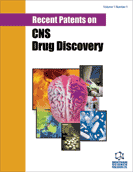Abstract
Obesity is considered one of the risk factors for metabolic disorders. There is increasing evidence that obesity is under control of several cytokines and hormone in the brain. Brain histamine and H3 receptors are important factors for regulating obesity. The results of physiological and pharmacological studies revealed that brain histamine and H3 receptors are involved in the regulation of obesity. In this review, we describe the implication and patent for developing H3 receptor antagonists and their therapeutic potential of obesity.
Keywords: Histamine, obesity, histamine H1 receptors, histamine H3 receptors
Recent Patents on CNS Drug Discovery (Discontinued)
Title: Therapeutic Approach of Histamine H3 Receptors in Obesity
Volume: 2 Issue: 3
Author(s): Takayuki Masaki and Hironobu Yoshimatsu
Affiliation:
Keywords: Histamine, obesity, histamine H1 receptors, histamine H3 receptors
Abstract: Obesity is considered one of the risk factors for metabolic disorders. There is increasing evidence that obesity is under control of several cytokines and hormone in the brain. Brain histamine and H3 receptors are important factors for regulating obesity. The results of physiological and pharmacological studies revealed that brain histamine and H3 receptors are involved in the regulation of obesity. In this review, we describe the implication and patent for developing H3 receptor antagonists and their therapeutic potential of obesity.
Export Options
About this article
Cite this article as:
Masaki Takayuki and Yoshimatsu Hironobu, Therapeutic Approach of Histamine H3 Receptors in Obesity, Recent Patents on CNS Drug Discovery (Discontinued) 2007; 2 (3) . https://dx.doi.org/10.2174/157488907782411792
| DOI https://dx.doi.org/10.2174/157488907782411792 |
Print ISSN 1574-8898 |
| Publisher Name Bentham Science Publisher |
Online ISSN 2212-3954 |
 5
5Related Articles
-
Cardiac Role of the Transcription Factor NF-κB
Cardiovascular & Hematological Disorders-Drug Targets On Scaffolds and Hopping in Medicinal Chemistry
Mini-Reviews in Medicinal Chemistry Diagnosis and New Approaches in the Therapy of Gestational Diabetes Mellitus
Current Diabetes Reviews Exploiting High-Throughput Ion Channel Screening Technologies in Integrated Drug Discovery
Current Pharmaceutical Design Ischemic Strokes in Congenital Bleeding Disorders: Comparison with Myocardial Infarction and other Acute Coronary Syndromes
Cardiovascular & Hematological Disorders-Drug Targets Reverse Induced Fit-Driven MAS-Downstream Transduction: Looking for Metabotropic Agonists
Current Medicinal Chemistry Gastrophysics of the Oral Cavity
Current Pharmaceutical Design Graphical Abstracts
Current Diabetes Reviews Current and Future Drug Treatments for Glioblastomas
Current Medicinal Chemistry The Accuracy of Self-Reported Hypertension: A Systematic Review and Meta-Analysis
Current Hypertension Reviews Foreword
Current Nutrition & Food Science Asymmetric Dimethyl-L-Arginine (ADMA): A Possible Link Between Homocyst(e)ine and Endothelial Dysfunction
Current Drug Metabolism Prevention of Renal Complications Induced by Non- Steroidal Anti-Inflammatory Drugs
Current Medicinal Chemistry Complex of Nifedipine with Glycyrrhizic Acid as a Novel Water-Soluble Antihypertensive and Antiarrhythmic Agent
Letters in Drug Design & Discovery Leveraging NMR and X-ray Data of the Free Ligands to Build Better Drugs Targeting Angiotensin II Type 1 G-Protein Coupled Receptor
Current Medicinal Chemistry Atherogenesis in White Coat Hypertension
Current Hypertension Reviews Is Impaired Flow-Mediated Dilatation of the Brachial Artery a Cardiovascular Risk Factor?
Current Vascular Pharmacology New Inotropic Pharmacologic Strategies Targeting the Failing Myocardiumin the Newborn and Infant
Mini-Reviews in Medicinal Chemistry Perspectives in Medicinal Chemistry: Metalloprotein Inhibitors: What Have We Made and What is the Next Step?
Current Topics in Medicinal Chemistry Resveratrol: A Therapeutic Promise for Cardiovascular Diseases
Recent Patents on Cardiovascular Drug Discovery






















